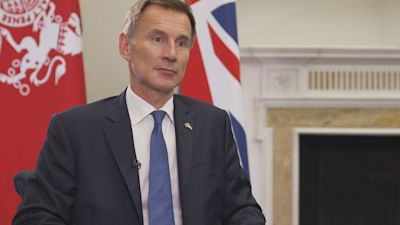Change in leadership would cause 'more instability', says Jeremy Hunt

Jeremy Hunt says a change in leadership at such a turbulent time would cause 'even more instability' as he defends Liz Truss in an interview with Political Editor Robert Peston
Jeremy Hunt has warned against a change in leadership as the pressure grows on Liz Truss' premiership.
He added he will have to make "tough" decisions on the UK's finances after reversing the vast majority of Ms Truss' economic strategy.
The new chancellor, who served under David Cameron and George Osborne's Conservative government during a programme of austerity, has refused to rule out further spending cuts.
He raised approximately £32 billion after reversing most of his predecessor Kwasi Kwarteng's proposed £45 billion in tax cuts - which would have been funded by public borrowing.
But Mr Hunt has said more measures will be needed to balance the books and restore economic stability.
Asked if these cuts will feel the same as the height of austerity, the chancellor told ITV News' Political Editor Robert Peston: "I don't believe they will.
"I was running a government department in 2021 that saw its budget cut by 24% and I know exactly how hard that was.
"I don't think we are in that territory, but I don't want to minimise how tough these decisions are, and I don't want to pretend that they won't be on the spending side as well as on the taxes going up side."
'I would prefer a leader who listens, who learns,' Jeremy Hunt admits 'mistakes were made' following his emergency statement
The chancellor explained his plans in more depth as the prime minister battles to save her premiership with her economic strategy in tatters.
Mr Hunt's statement on Monday in the Commons, given as Ms Truss watched in the background, sounded the final death knell for the PM's free-market experiment, dubbed "Trussonomics".
Her programme of swingeing tax cuts and radical de-regulation aimed to kick-start economic growth, but would have been funded by a huge increase in public borrowing.
Critics said Ms Truss' embrace of so-called "trickle-down economics" would benefit mainly the rich at a time when the country's most vulnerable are facing an unprecedented cost of living crisis.
Robert Peston analyses Monday's unprecedented events
The International Monetary Fund issued a number of criticisms of Ms Truss' plans, which clashed with the Bank of England's raising of interest rates in a bid to get a grip of rampant inflation.
Financial markets were spooked by the government's strategy, resulting in a huge crash in the pound against the dollar - potentially making inflation even worse than before.
Mr Hunt told MPs: “We are a country that funds our promises and pays our debts and when that is questioned – as it has been – this government will take the difficult decisions necessary to ensure there is trust and confidence in our national finances.
“That means decisions of eye-watering difficulty.”
He said: “every one of those decisions, whether reductions in spending or increases in tax” would be shaped by “compassionate Conservative values”.
The UK's fourth chancellor in four months warns of difficult times ahead
It was only three weeks ago that Mr Hunt's predecessor, Kwasi Kwarteng, revealed a so-called "mini-budget" comprising of £45 billion in tax cuts funded by borrowing.
This has now been reduced by around £32 billion by the new chancellor, who critics say has been brought in to clean up the government's mess.
Even before Mr Kwarteng was sacked last Friday, he'd already U-turned on his pledges to scrap the 45p top rate of income tax and to cancel a rise in corporation tax.
With so many changes in Ms Truss' six weeks in office, many both outside and within her party are questioning what credibility she has left.
The PM said the government was taking action to “chart a new course for growth that supports and delivers for people across the United Kingdom”.
But Angela Richardson became the fourth Tory MP to call publicly for Ms Truss to stand down, saying the problems with the public finances were “100% down to the prime minister”.
She told Times Radio: “I just don’t think that it’s tenable that she can stay in her position any longer. And I’m very sad to have to say that.”
While under current party rules Ms Truss is protected from a leadership challenge for 12 months, that could easily change if enough Tory MPs demand change.
Former chief whip Andrew Mitchell said the prime minister had just a fortnight to save her premiership and “if she cannot do the job, she will be replaced”.
Want a quick and expert briefing on the biggest news stories? Listen to our latest podcasts to find out What You Need To Know